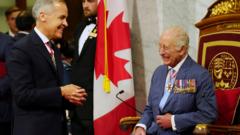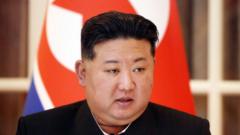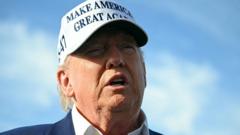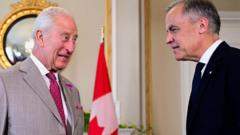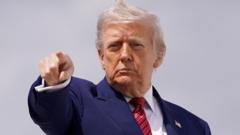The U.S. President's decision aims to ease tensions with the E.U. amid ongoing trade discussions.
**Trump Delays Tariffs on EU Imports, Sparking Trade Negotiation Hopes**

**Trump Delays Tariffs on EU Imports, Sparking Trade Negotiation Hopes**
President Trump extends the deadline for E.U. tariffs to facilitate negotiations.
President Trump announced a delay in imposing a 50% tariff on E.U. imports, pushing the deadline from June 1 to July 9. This extension, attributed to a positive dialogue with Ursula von der Leyen, the president of the European Commission, provides both parties additional time to negotiate and resolve trade issues. Von der Leyen described the conversation with Trump as encouraging, emphasizing the need for a collaborative effort to reach a trade agreement quickly.
The move follows Trump's earlier remarks indicating a stalemate in discussions with the E.U., raising concerns about a potential trade war that could impact one of the world’s largest economies. Political analysts are divided on the implications of this tariff delay. Some view it as a constructive step toward maintaining transatlantic trade relations, while others caution that persistent disagreements in negotiations could evolve into more aggressive trade measures if resolution is not achieved by the new deadline.
This decision is seen as part of Trump's broader strategy to bolster American economic interests. While proponents argue it may protect U.S. industries from foreign competition, critics warn it may lead to retaliatory measures by the E.U., potentially destabilizing global trade networks. The outcome of the ongoing negotiations remains uncertain, as both sides are urged to address each other's concerns effectively to prevent further escalation.
In related news, discussions around international trade dynamics continue to unfold as countries navigate complex relationships amidst evolving economic challenges and geopolitical tensions. The role of tariffs in trade policy will likely remain a focal point in U.S.-E.U. relations in the coming months.
The move follows Trump's earlier remarks indicating a stalemate in discussions with the E.U., raising concerns about a potential trade war that could impact one of the world’s largest economies. Political analysts are divided on the implications of this tariff delay. Some view it as a constructive step toward maintaining transatlantic trade relations, while others caution that persistent disagreements in negotiations could evolve into more aggressive trade measures if resolution is not achieved by the new deadline.
This decision is seen as part of Trump's broader strategy to bolster American economic interests. While proponents argue it may protect U.S. industries from foreign competition, critics warn it may lead to retaliatory measures by the E.U., potentially destabilizing global trade networks. The outcome of the ongoing negotiations remains uncertain, as both sides are urged to address each other's concerns effectively to prevent further escalation.
In related news, discussions around international trade dynamics continue to unfold as countries navigate complex relationships amidst evolving economic challenges and geopolitical tensions. The role of tariffs in trade policy will likely remain a focal point in U.S.-E.U. relations in the coming months.



